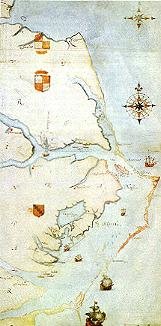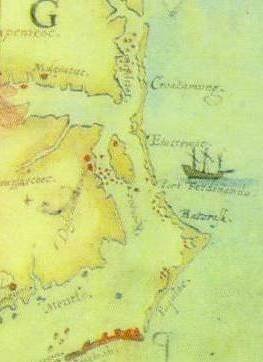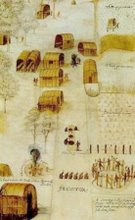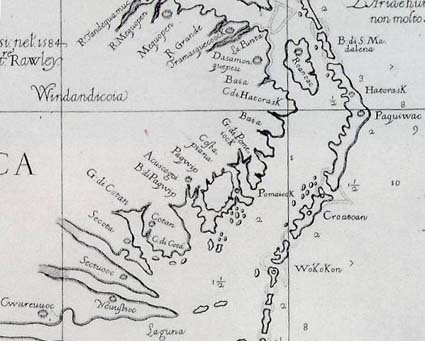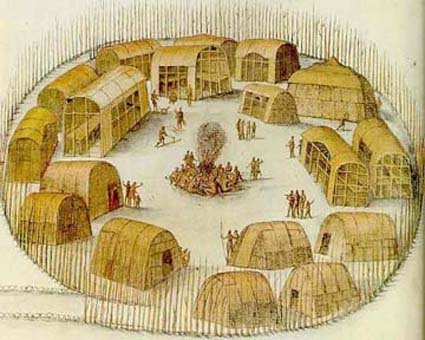
--------------------------------------------------------------------------------
BIBLIOGRAPHY OF BOOKS, PAMPHLETS, AND ARTICLES ON THE ROANOKE ISLAND COLONIES
Some of the following works are valuable sources of information about England's attempts to explore and settle North America in the 1580s. Others reveal attitudes toward, and interpretations of, these attempts. Many recently published books and pamphlets are still in print; older books are available in the rare-book collections of some large libraries or in facsimile reprints. Some of the articles are difficult to find except in a university library. Publications such as the Reader's Guide to Periodical Literature and America: History and Life and indexes to scholarly journals such as North Carolina Historical Review and The William and Mary Quarterly list numerous articles too specialized for inclusion here. This flyer is based loosely on England, Sir Walter Raleigh, the Roanoke Colonies, by William S. Powell.
Cont. here:
http://www.nps.gov/archive/fora/biblio.htm
Contact Information:
http://www.nps.gov/fora/biblio.htm
Fort Raleigh National Historic Site
National Park Service
Rt. 1, Box 675
Manteo, NC 27954
Call (252) 473-5772
Wednesday, January 28, 2009
Lost Colony of Roanoke Resources
Posted by
Historical Melungeons
at
1/28/2009 03:24:00 PM
![]()
Labels: lost colonists, lost colony, sir walter raleigh, william powell
Tuesday, January 27, 2009
Online Dictionary of Elizabethan English
Hat Tip: Melungeon Historical Society
Online Dictionary of Elizabethan English
This site not only includes an online dictionary of Elizabethan English but other cultural and historical information about the Elizabethan Age, all pertinent to the early colonial period in America which immediately followed.To visit the site: Click Here.
Posted by
Historical Melungeons
at
1/27/2009 11:09:00 AM
![]()
Labels: dictionary, elizabethan
Monday, January 5, 2009
Barbados: South Carolina's Mother Colony
When most of us were in elementary school, we learned about the English settlement at Jamestown and the Pilgrims' landing at Plymouth Rock. It seemed that all 13 American colonies were settled by people who sailed directly from the British Isles or continental Europe.
But one colony was different. Many of South Carolina's early settlers – and an even higher proportion of its leaders – came from the English colony of Barbados.
Barbados is the most eastern island in the West Indies. It lies off the northeastern coast of South America and is sandwiched between the Atlantic Ocean on its east and the Caribbean Sea on its west. At 166 square miles, Barbados is less than half the size of South Carolina's smallest county, McCormick.
British colonists first arrived in Barbados in 1627, and by 1645 there were 11,200 farms and plantations on the island. In just 18 years sugarcane had become an extraordinarily profitable crop, but one that required lots of land and slave labor.
Land, of course, was limited on Barbados, and many planters decided to sell their property and invest in the newly formed colony of Carolina, where land and the opportunities it provided seemed unlimited.
continue on SCIway
Posted by
Historical Melungeons
at
1/05/2009 09:40:00 PM
![]()
Labels: Barbados, South Carolina
Thursday, January 1, 2009
Roanoke Colonies Research Newsletter
Volume 4.1 (November 1996)
Manteo, Wanchese, or Whoever?
David Beers Quinn Emeritus, University of Liverpool
We know nothing about Manteo and Wanchese in the early months of 1585. Manteo certainly helped Ralegh and Barlowe in the closing months of 1584 when material was being prepared for Barlowe's narrative and for the publicity associated with Ralegh's bill before Parliament, but thereafter he would have had Manteo and Wanchese on his hands at a time when he was putting every penny he had into the preparation of the new expedition. It does not seem improbable that he would have introduced them to the households of his friends and supporters in order to spread the expense of maintaining them. It might appear he did so in the case of the Earl of Leicester, one of Queen Elizabeth's closest advisers. It so happens that the Royal Historical Society has just published a volume of the surviving household accounts of Leicester, Household Accounts and Disbursement Books of Robert, Earl of Leicester, 1558 to 1585 (Camden Fifth Series 6 [London: Cambridge UP for the Royal Historical Society, 1995]). In it, the following item appears:
Gyven in reward the same day [January 6,1585]
by your lordship's commandement to Mr
[Master, but actually Sir] Rawles Blackamoore
xx s. [twenty shillings]. (210)
The Shorter Oxford Dictionary's definition of a blackamoore is "a Negro; any very dark-skinned person." Leicester's servant who compiled the account could well have used it for one of the two Carolina Algonquian men who were, at this time, in Ralegh's care. We do not know that he had any other dark-skinned person in his household, even if neither Manteo nor Wanchese could be described as "very dark-skinned," even if they were darker-skinned than the average Englishman.
We must be careful, however, since Leicester had had a dark- skinned person in his household in the previous year. Under April 17,1584, we have:
Gyven in reward the same day by your
lordship's commandment to the blackamore v
s. [five shillings].
This person evidently lived at Leicester House as a mattress was supplied for him-an African from Morocco or Guinea we must assume. The fashion of keeping a black servant in a noble household may already have become established, while we know that, in late Elizabethan times, Africans were to be found living in port areas in London and Plymouth.
We must be cautious about the identity of Ralegh's "blackamoore," but there is perhaps more than a chance that he was either Manteo or Wanchese.
From Roanoke Colonies Research Office
Posted by
Historical Melungeons
at
1/01/2009 12:17:00 PM
![]()
Labels: David Beers Quinn, manteo, Roanoke Colonies Research Newsletter



